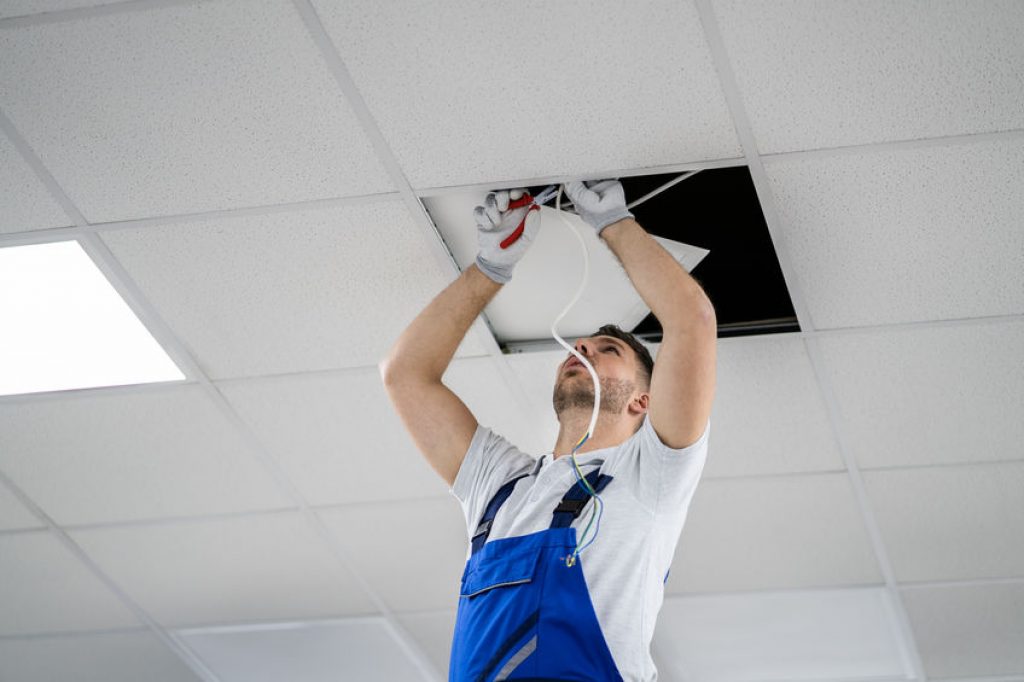Handyman Liability Insurance
Handyman liability insurance is a must-have for anyone commissioned to perform domestic repairs and minor renovations.
Need
Handyman Liability Insurance ?
Get Your Free Quote
A handyman – also referred to as a handy worker, handyperson, or fixer – is a skilled worker who specializes in repairs, typically around the home or office.
Handymen are generally equipped with the knowledge and tools of the trade and are oftentimes a preferred choice for home repairs compared to professional service companies, who can be more expensive and less responsive.

A handyman is not just popular for homeowners, but is frequently the preferred service provider for small to medium-size businesses.
Due to the possible risks associated with the services handymen provide, professional handymen should be covered with Handyman Liability insurance, and here’s why!
Different Types of Handyman Services
Drywall Installation
This is one of the most common types of handyman services that are geared towards both commercial and residential spaces. Drywall installation is a service that is performed during a home or office remodel or after a water damage remediation job, etc.
In most cases, professional handymen are equipped with the toolkits needed to measure, cut, and install drywall boards in homes and offices with superior skill and precision.
Small Business General Liability Protection:
Get Your Free Quote
Does a Handyman do Roofing?
In a general repair job you may be asked to include some work on roofing structure, tiling or shingles.If you are doing more and more of this special work, with its particular risks, make it a point to add roofing insurance, which is a specialized type of handyman insurance that covers basic roofing risks, such as a customer injured by falling shingles or dropped tools.
Smart Home Upgrade Installation
We live in a technology-driven era, which has given rise to smart home devices that all homeowners love to install, but aren’t technically qualified to do themselves.
That’s where handymen come in handy, and professionals in the smart home device handyman business can install everything from thermostats, sensors, monitors to doorbells.
Some handymen are even certified in home electrical systems, so they can take care of any home electrical wiring or other similar complex electrical installations with ease.
Interior and Exterior Painting
Another common service undertaken by handymen is painting! One of the main reasons many homeowners and property managers commission handymen to paint is when renovating their homes or when trying to boost curb appeal.
Painting the exterior or interior of a house, especially a big one, requires effort and knowledge, and most homeowners call on skilled handymen with the right experience and tools such as drop cloths, paint rollers, ladders, and furniture covers to tackle all types of painting jobs.
Top Risks for Self-Employed Handymen: Navigating Challenges in Independence
Embarking on a career as a self-employed handyman offers a unique blend of independence and the opportunity to directly reap the rewards of your hard work. However, this path is not without its challenges. From the unpredictability of income to the inherent risks of the job itself, handymen face a variety of obstacles that require careful navigation.
The following table outlines the top risks associated with being a self-employed handyman, highlighting the multifaceted nature of these challenges and underscoring the importance of preparedness and strategic planning
| Risk Category | Specific Risks |
|---|---|
| Financial | – Irregular income and cash flow issues – Lack of employment benefits (e.g., health insurance, retirement savings) – Higher tax burden and complexity |
| Legal | – Liability for damages or injuries at work – Non-compliance with local licensing and regulation requirements – Contract disputes |
| Health and Safety | – Risk of personal injury due to the physical nature of the job – Potential exposure to hazardous materials – Long-term health issues from repetitive movements |
| Operational | – Dependence on a small number of clients for income – Difficulty in sourcing quality materials at competitive prices – Challenges in managing schedules and deadlines |
| Market | – Competition from other handymen and larger companies – Economic downturns reducing demand for services – Changes in market needs and technology affecting demand |
| Professional Growth | – Challenges in keeping skills up-to-date with current standards and technologies – Limited opportunities for professional networking and growth |
Self-Employed Handymen Insurance can provide crucial protection against many of the risks faced by self-employed handymen, offering a safety net that covers everything from liability to health and operational hazards.
Is Handyman Liability Insurance Worth it?
As a handyman, whether licensed or not, you should invest in handyman liability insurance cover when working on any one or more types of the jobs mentioned above.
But although the law in most states doesn’t require handymen to buy handyman liability insurance, securing handyman liability insurance is a great way to limit risks in case you damage a customer’s home or office when performing handyman services.
Consider this – if a basic handyman toolkit that’s going to cost just a few hundred dollars to replace is stolen from your truck, maybe it’s not a big deal, because some car insurance policies cover theft from the vehicle as well.
But if you’re a handyman offering plumbing services, and by accident drilled a hole through the wrong pipe, causing over $10,000 in damage, that would hurt your pockets, so having handyman liability insurance protects you.
The handyman business, whether it’s painting or drywall, has fierce competition, and you also know that customers have a sea of options when choosing the right handyman for the job. When you can tell them that you are fully insured, then they know that you are a professional, and that they are also covered in case of some accident.
When trying to decide whether to get handyman liability or not, ask yourself one question!
If something does go wrong when providing my handy services, will I be able to easily cover the cost of damage without putting myself in a financial bind?
By buying handyman liability insurance, you give your handyman service business an edge over the competition even if you’re a “one man band”.
Given the surge in home break-ins, which in terms of numbers equates to one home burglary every 15 seconds, many homeowners are hesitant about letting strangers into their home, even if you have a handyman website and uniform.
However, with handyman liability insurance cover, you enhance your credibility as well as reputation — two things homeowners look for before welcoming any handyman into their home.
Homeowners are also more likely to choose a handyman with handyman liability insurance cover as opposed to one without because it indicates that you’re serious about your business, and are financially sound to cover the costs of damage resulting from your services.
If you’re applying for a handyman license, some states such as Utah require you to show some proof of handyman liability insurance, typically if you’re working on projects worth more than $3000.
Further, if your target marker is apartment complexes or financial institutions, you will definitely need some type of handyman liability insurance cover to protect yourself, the residents and property.
What Type of Insurance Does a Handyman Need?
Public Liability Insurance
Public liability insurance is the most basic yet highly important type of insurance for handymen. This kind of insurance covers claims made by the public, i.e., the clients/homeowners you will be providing handyman services for.
So, what exactly does public liability insurance cover? Firstly, loss or damage to property, personal injuries and death.
With regards to handymen, damage could be as simple as knocking over your customer’s antique $5000 vase or dripping water on their $100,000 Bose home theater system.
In terms of personal injury, it could involve your customer tripping over your power cord, and suffering an injury as a result.
Public liability claims can be huge, where some range from $5000 in minor property damage to as much as $1 million for serious claims involving personal injury or death.
And since damage can be caused by just about anyone, whether you’re just starting your handyman service business or are a seasoned professional handyman, it’s important that you are covered with handyman liability insurance before stepping into a customer’s home.
Tool Insurance
Whether you store your tools in your truck or temporarily at the job site, the chances of them getting stolen should not be overlooked. Comprehensive car insurance covers certain things such as stolen vehicles, car parts that were stolen from your vehicle, and repair damage to your car or truck as a result of theft or break-in.
However, comprehensive insurance does not cover theft of your personal belongings such as your laptop, phone, or tools.
And given that tools aren’t cheap, where even a powerful drill costs $300+, it may be hard to replace immediately in the event of theft.
Tool Insurance can be added to your handyman liability insurance and pays to replace your equipment in case of damage or theft. There are a multitude of different tools that can be insured including hired equipment, and personal tools including hand tools and power tools.
Income Protection
Being a handyman offers several benefits, most notably being your own boss! But there’s a possible downside too — you’re self-employed, so you don’t have access to sick leave and most importantly workers’ compensation.
This means that if you take time off due to one or more reasons such as personal injury or if your business is seasonal such as landscaping or snow plowing, then you’re left with zero income.
This is where handyman income protection becomes absolutely vital, and depending on the coverage you buy, it can replace up to 80 percent of your handyman income for a period of time as stated in your policy.
Getting income protection insurance is a great way to build a good base when starting your handyman business, keeping in mind the inevitable.
Does My Homeowners Insurance Cover Handyman?
Well, in most cases your homeowner’s insurances will not cover handymen or any other type of workers performing services on your property.
The personal coverage you have on your home is just that — “personal”, so almost surely, chances are that it will not extend to work done by contractors.
This means that any damage done to your home as a result of the handyman’s services will not be covered under your homeowners’ insurance policy.
What if the Handyman Gets Hurt on Your Property?
Good question, yet a tricky one! One of the key reasons to get a homeowners insurance policy is the inclusion of personal liability insurance.
Personal liability insurance included in your homeowners’ covers you and the residents of your home for damages and injury sustained by others, for which you are legally responsible.
This is a tricky area. Any injury sustained by contractors working inside your home may not be covered under your homeowners’ policy, and you could end up paying the price if the contractor does sustain an injury on your property and claims that you were responsible, especially if they don’t have handyman liability insurance coverage.
As a homeowner, you need to perform due diligence on the handyman before hiring him/her for the job, or else you may be responsible to pay tens of thousands in medical bills and lost wages.
Are Handyman Injuries Common?
Certain handyman jobs can be dangerous, even if it’s just climbing up a ladder to unscrew a fused light bulb. Research from the Occupational Safety and Health Administration indicates that more than 20 percent of worker fatalities stemmed from the handyman industry.
This means that if you have more than one handyman working on a big job in your home, there’s a big chance of injury to at least one of them.
Things you can do to protect yourself as a homeowner when hiring a handyman are confirming their proof of insurance and coverage and confirming the license.
How Much Does Handyman Liability Insurance Cost?
The cost of handyman liability insurance varies across companies, and depends on the coverage you opt for.
The price you pay for handyman insurance is based on a variety of factors including the type of handyman services you provide, the size of your business, and the number of people that work for you.
But to give you a ballpark figure, handyman liability insurance starts at approximately $30 per month. General handyman insurance covers you for claims related to injury to people other than yourself or your employees, damage done to property caused by your services, and personal injury as well.
Handyman insurance policies are generally available in a variety of different plans, each offering one or more types of coverage.
For example, a basic plan would cover handymen for general liability insurance and professional liability insurance, whereas a pro plan would cover you for the same, but offer a higher aggregate limit.
It is important to pay attention to the aggregate limit handyman insurance provides, as this number indicates the payout limit for any, and all claims for the entire term of the policy.
On that note, you should also make note of the deductible for the handyman insurance policy, which is the amount you will have to pay out of pocket, before the insurance company picks up the rest of the tab.
What Are The Handymen License Requirements in The USA?
In the United States, the requirements for a handyman license vary by state and local jurisdiction. Some states may not require a handyman to have a license at all, while others may require a specific license or certification for certain types of work.
In general, a handyman is a person who performs a variety of minor home repairs and maintenance tasks. These tasks may include repairs to electrical systems, plumbing, carpentry, and other household systems. Handymen may also perform minor renovations, such as painting or installing new fixtures.
To obtain a handyman license, you may need to meet certain requirements, such as:
-
Meeting any state or local requirements for licensing or certification. This may involve completing a certain number of hours of training or education, passing an exam, or both.
-
Having a certain level of experience in handyman work. This may involve working as a handyman for a certain number of years or completing a certain number of projects.
-
Having the necessary tools and equipment to perform handyman tasks. This may include basic hand tools, such as screwdrivers and wrenches, as well as more specialized equipment, such as power saws or plumbing tools.
-
Obtaining any necessary insurance or bonding. This may include liability insurance to protect you and your customers in case of accidents or injuries, as well as bonding to protect your customers in case you fail to complete a project or do not meet the agreed-upon terms of your contract.
It’s important to check with your state or local government to find out the specific requirements for a handyman license in your area.
Finding the Best Insurance at the Right Cost for Self-Employed Handymen
Selecting the right insurance is crucial for self-employed handymen, as it protects against a wide range of risks that can impact their business. When considering insurance costs for self-employed handymen businesses, it’s essential to evaluate policy limits, the scope of coverage, and specific business needs.
Comparing quotes from several insurance providers is a wise strategy, and obtaining an online quote can simplify this process. The choice of an insurance plan should be informed by a thorough comparison of these elements to ensure adequate protection against the unique challenges faced by handymen.
Business Insurance Calculator – Estimate Costs for Self-Employed Handymen
To accurately estimate insurance costs, self-employed handymen can utilize an online business insurance calculator. This tool helps in determining the potential expenses for various insurance policies, offering a tailored approach to budgeting for insurance costs. By inputting specific business details, handymen can receive instant estimates, making financial planning more efficient.
Small Business Risk Assessment
Understanding and managing risks is crucial for the longevity of any business, including those operated by self-employed handymen. A small business risk assessment tool can provide invaluable insights into potential risks. This online resource helps handymen identify and prioritize risks, enabling the development of effective strategies to mitigate them.
Temporary Business Insurance
For self-employed handymen, flexibility in insurance coverage can be particularly beneficial. Options for temporary business insurance allow for coverage that aligns with the fluctuating needs of their business. Whether it’s by the month, day, or hour, this type of insurance ensures that handymen are covered exactly when they need it, without overcommitting to long-term policies.
By carefully considering these aspects and utilizing available online tools and resources, self-employed handymen can secure the best possible insurance coverage, safeguarding their business against a wide array of risks.
Final Thoughts
As a handyman, getting handyman liability insurance shouldn’t be an option! Whether you’re just getting started or are a pro in your respective trade, you probably don’t have the loads of cash you may need to pay for damages caused to a customer or their property as a result of your services.
Handyman liability insurance also protects you, and your tools against injury, damage and theft, so it’s truly a win-win deal — build a loyal customer base, and safeguard your interests.
And the best part about handyman liability insurance is income protection, which covers you in case you’re experiencing downtime in your business, due to personal injury or seasonal work.
Information by state:
customize your handyman liability insurance:
- AL handyman insurance
- AK handyman insurance
- AZ handyman insurance
- AR handyman insurance
- CA handyman insurance
- CO handyman insurance
- CT handyman insurance
- DE handyman insurance
- DC handyman insurance
- FL handyman insurance
- GA handyman insurance
- HI handyman insurance
- ID handyman insurance
- IL handyman insurance
- IN handyman insurance
- IA handyman insurance
- KS handyman insurance
- KY handyman insurance
- LA handyman insurance
- ME handyman insurance
- MD handyman insurance
- MA handyman insurance
- MI handyman insurance
- MN handyman insurance
- MS handyman insurance
- MO handyman insurance
- MT handyman insurance
- NE handyman insurance
- NV handyman insurance
- NH handyman insurance
- NJ handyman insurance
- NM handyman insurance
- NYC handyman insurance
- NC handyman insurance
- ND handyman insurance
- OH handyman insurance
- OK handyman insurance
- OR handyman insurance
- PA handyman insurance
- RI handyman insurance
- SC handyman insurance
- SD handyman insurance
- TN handyman insurance
- TX handyman insurance
- UT handyman insurance
- VT handyman insurance
- VA handyman insurance
- D.C handyman insurance
- VA handyman insurance
- WV handyman insurance
- WI handyman insurance
- WY handyman insurance










